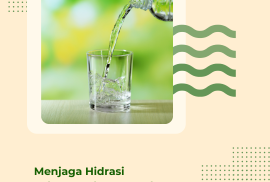Adolescents have an important role in the development of a nation, because healthy adolescents are an investment in the future. One of the health problems that become a burden on adolescents, especially young women, is anemia. Anemia is a condition characterized by a lack of red blood cells in the body, causing fatigue, tiredness, lethargy and impacting the patient’s productivity. In addition, young women who experience anemia are at greater risk of giving birth to low birth weight (LBW) babies and stunting (Sartika et al., 2021). The prevalence of anemia in adolescents in Indonesia is quite high, at 32% (Riskesdas, 2018). Therefore, the prevention and control of anemia in young women is a health problem that is focused on by the government.
2022
Anemia is a blood disorder condition defined by a lack of red blood cells in the body or the red blood cells can not function properly. This condition causes the body not getting enough oxygen. Anemia is a serious global health problem. Based on WHO, anemia still affects 42% of children aged <5 years and 40% of pregnant women. Symptoms that are often experienced by people with anemia are easily tired, easily drowsy, dizziness, and pale face. The most common cause of anemia is a lack of nutrients, such as vitamin B12, folate, vitamin A, and iron.
Eid Al-Fitr or Lebaran is a day that is highly awaited by Muslims, not only in Indonesia, but also all around the world. Eid is identical with a family gathering and also the tradition of eating together with family. Many types of food and drinks are served during Eid. In Indonesia, the usual menus are lontong opor ayam, rendang, meatball soup, Eid cakes, snacks, and sweet drinks.
Some people make Eid or Lebaran as a time of revenge to eat as much as they want, after having fast for about 30 days in the month of Ramadan, within 13-14 hours every day. However, this phenomenon cannot be justified. Why? Because it can cause an unfavorable impact for the body, for example: increasing weight drastically, and also increasing blood sugar and cholesterol levels in our bodies.
The food pattern during fasting is certainly changing. The changes occur when food consumption is limited so that the frequency of eating and the amount of food consumed are more limited. In general, people consume a portion of food three times a day but during fasting it changes to two times a day. Although eating patterns change during fasting, people must maintain optimal and balanced nutritional intake so that their body condition remains healthy and can undergo fasting properly. Therefore, the foods fulfillment with carbohydrates, fiber, vitamins and minerals, fats, and proteins must be considered accordingly.
Certainly it is not an easy thing to hold thirst for more than 12 hours per day. Under normal circumstances, adult body requires ± 2 liters of fluid every day. Lack of fluids can cause disturbances in brain function such as difficulty thinking, headaches, fatigue, and impaired muscle function. Therefore, in this article, we will discuss tips that can be done to keep the body hydrated during fasting.
- Drink enough water
During fasting, our bodies can experience mild dehydration which is characterized by headaches, fatigue, and difficulty concentrating. To prevent excessive thirst, we can divide the time to drink water with the following pattern: 1 glass when breaking the fast, 1 glass after dinner, 1 glass after Isha’ time, 1 glass after Tarawih time, 1 cup before bed, 1 cup after wake up, 1 glass at dawn, and 1 glass before Fajr. The volume of water that is drunk at one time should not be excessive (only about 250 – 300 mL / glass) because the body will not be able to absorb large amounts of water at once. Dairy products such as milk and yogurt are also high in water content so they are good for supplementing daily fluid needs.
Because of the negative effects, intermittent fasting is not recommended for pregnant women and nursing mothers, children and adolescents under the age of 18, those at risk of hypoglycemia, diabetes, or people with certain chronic diseases. If you have side effects like headaches, nausea, or other symptoms after practicing intermittent fasting, you should consult a doctor. There are several methods that can be used by those who want to start intermittent fasting, including:
- The 5:2 Diet
This method is used twice a week and involves eating only one portion of food (about 500-600 calories). To keep calories low when fasting, it is highly recommended to eat foods high in fiber and protein. On the other five days of week, you are free to eat normally. If you choose to eat normally every day of the week except Sunday and Monday, for example.
Intermittent fasting is an eating plan that involves restricting calorie intake or not eating either for a set period of time on a regular schedule. Intermittent fasting focuses on when you eat and when you don’t eat, instead of what foods you should eat less or more of. Intermittent fasting is practiced in a similar way as Ramadan fasting, which involves fasting for approximately 12 hours. Intermittent fasting gives an advantage, including increasing the immune system, lowering cholesterol, reducing risk factors for cardiovascular disease and lowering blood pressure.
Stunting is one of the chronic nutritional problems in Indonesia. The prevalence of stunting in Indonesia is quite high, ranked number 2 in Southeast Asia (1). Based on Riskesdas 2018, the prevalence is 30.8% and it is estimated to decrease to 26.92% in 2020 (2, 3). However, this figure is still within the upper threshold for stunting prevalence which is 20% set by WHO. This is an important problem that needs to be addressed together either by the government or by the community.
Stunting or short toddlers is a condition of failure to thrive that occurs in children under five due to chronic malnutrition, especially in the period of the First 1,000 Days of Life (HPK) (4). Stunting conditions are generally caused by low nutritional intake and health status for a long time, lack of access to sanitation and clean water resulting in repeated infections, and inadequate parenting (4).
The month of Ramadan is a special month for Muslims around the world. In Ramadan, Muslims are obliged to observe fast worship with restraint from indulgence and everything that can cancel fasts such as eating and drinking from sunrise to sunset. Not only spiritual, but fasting can also have a physical effect. A study carried out in Saudi Arabia indicates that when a person fasts, the individual will also experience some changes in his daily life, such as eating habits, sleeping habits, and even metabolism in his body may change (Bahammam, 2010 in Norhasanah & Salman, 2021).
In Ramadan month, Muslims across the world will fast during the hours of daylight and can not eat or drink until the sun sets. Fasting can be challenging since our body does not get any food and fluid intake for around 13 hours. During fasting, the body uses carbohydrate that is stored up in liver and muscles (1,2). Once all has been used up, it uses fat as an energy source (3). Meals must contain adequate carbohydrate and fat to prevent muscle breakdown. Hence, balanced diet is very important. There are some things to consider so that you will be in a good condition during fasting and worship remains smooth.








